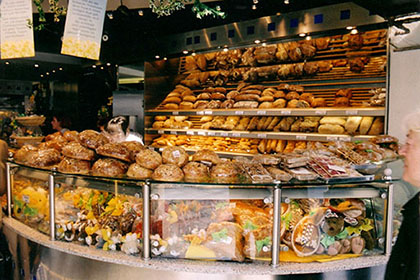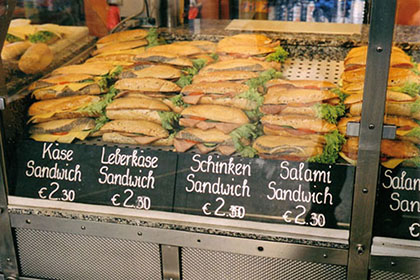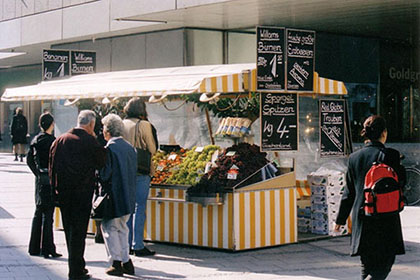4.1 Using ‘man’
Making generalisations using ‘man’
When you are talking about people in general in English, you might say ‘you’, ‘they’ or ‘people’ rather than the formal-sounding ‘one’. But man doesn’t have the same formal ring to it in German. Man takes the same verb form as er/sie/es. Compare the following sentences, for example:
Was kann man hier essen? What can you eat here? (literally: What can one eat here?)
Was trinkt man hier? What do people drink here?
Man bekommt überall Wein You (can) get wine anywhere
Übung 23
You can buy food and drink in many different places. In the activity below, match the descriptions with the right picture numbers.
Using the following two lists, match each numbered item with the correct letter.
Photo 3
Photo 6
Photo 4
Photo 2
Photo 5
Photo 1
a.Hier kann man Brot kaufen.
b.Hier kann man Bratwurst kaufen.
c.Hier kann man japanisch essen.
d.Hier kann man Kaffee trinken.
e.Hier kann man Obst und Gemüse kaufen.
f.Hier kann man ein Schinkenbrötchen kaufen.
- 1 = c
- 2 = d
- 3 = b
- 4 = f
- 5 = e
- 6 = a
Übung 24
On the island of Rügen, you might hear someone asking about what you can eat and drink there. Listen for the key words and fill in the gaps in the following sentences. You don’t need to understand everything.
Hören Sie und schreiben Sie.
Transcript: Übung 24
Abschnitt 13
Hören Sie bitte.
- Vokabeln
- aus der Umgebung from the surrounding area
- wer Fisch mag, der ist hier genau richtig anyone who likes fish feels at home here

1. Was kann man auf Rügen essen?
Man kann _____ essen.
2. Was trinkt man?
Man trinkt _____.
3. Was bekommt man auch?
Man bekommt überall auch _____.
Answer
These were the key words.
Man kann Fisch essen.
Man trinkt Bier.
Man bekommt überall auch Wein.






